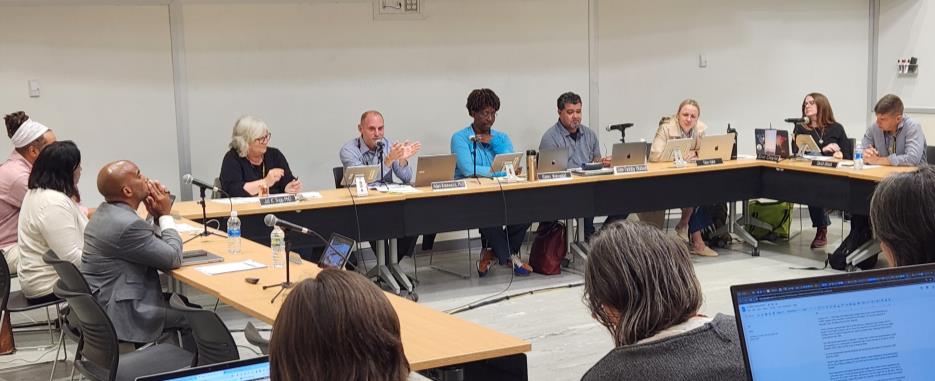
by Robert Lynch; June 14, 2024
A box full of “Vote Yes” buttons were scattered about the table at York Lecture Hall. Board of Education members were wise enough not to pin them on—state law, don’t you know. But others did. And many of the attendees who donned those buttons and crowded into the room also applauded speakers who spoke. It was Tuesday, June 11th and a Public Hearing into the proposed 2024-25 Ithaca City School District (ICSD) Budget, a budget that in recent weeks has gone on a diet.
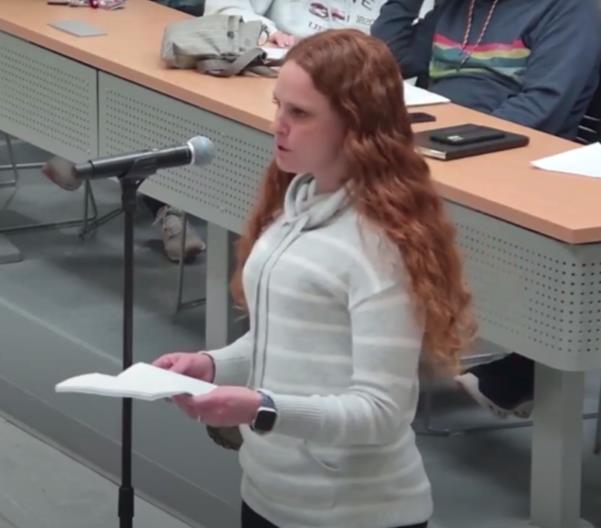
This new, now tax-cap compliant $163 Million spending plan will go before voters Tuesday, June 18th. A compact-car version of a revised budget in the Newfield School District will also face voter approval that day. Each district’s initial try at a budget failed the first time around back on May 21st. Since then, the Board of Education in each district has cut spending and trimmed tax levies. Ithaca’s reduction was far more drastic, given its size. Newfield’s Public Hearing was Monday, the tenth; Ithaca’s was the following night, Tuesday, the eleventh. This is Ithaca’s story.
“What kind of community do we want to be?” Belisa Gonzales asked the Ithaca School Board on hearing night. The newly-proposed package may be “a watered down version of that which I believe we needed,” she conceded. But its rejection, Gonzales predicted, will harm the “most vulnerable amongst us.”
Fifteen speakers ate up the first hour of the Board of Education’s five hour meeting Tuesday. It was the Public Hearing portion of the session, the portion set aside to review the revised budget. Of those who expressed a preference, nine spoke in favor of the new proposal; four remained firmly opposed.
At the last budget hearing—the one that considered the budget that failed—twenty people took to the mic. And all but one of them had promised to vote “No” when referendum day came. No doubt, each followed through on his or her promise. The initially-decided budget lost by a seven-to-one margin. Most blamed its loss on the 8.4 per cent tax levy increase it carried. With property reassessments tipping the scales against the Ithaca homeowner, that big of a bite in just one year became too big of a bite for taxpayers to swallow.
But the $5.9 Million in spending cuts the School Board has made since the initial budget’s defeat have slashed the tax levy increase to 2.92 per cent. Although some program-protecting parents and educators fear the latest cuts will handicap kids’ learning, the optics today look far better than they did a month ago. Moreover, what the program protectionists feared most on this more recent hearing night was the alternative; the doomsday scenario that would happen if this second budget also goes down.
Albany lawmakers give local educators only two bites of the fiscal apple each year. A second defeat in June would impose on Ithaca a mandatory “Contingency Budget.” It would hold the tax levy the same next year as it is now. But instead of $5.9 Million in reductions from the May budget, the knife would slice deeper, chopping away as much as $9 Million in spending. A Contingency Budget would put more students in each classroom and leave fewer teachers to teach them.
Heather Beasley is the parent of two kids at Cayuga Heights Elementary. She favors what’s now called the “Re-vote Budget,” the one that’ll be decided this month.
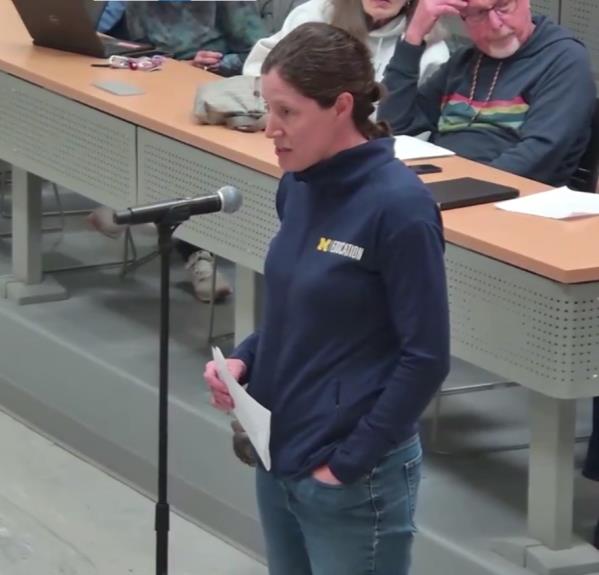
“Voters have made a statement,” Beasley stated. In May, she said, they rejected the first budget and tossed out two of the three incumbent Board members who sought reelection. That done, Beasley said, it’s our turn: “And now it’s time to make a statement in favor of our programs and our teachers and our communities.”
Steve Manley Zoomed in. He’s the parent of three and the treasurer of the Ithaca PTA Council.
“The public voted no on the previous budget and did so for a variety of reasons,” Manley stated. “The current budget may or may not respond to every one of (those) reasons,” he acknowledged. But a Contingency Budget, “will dramatically impact the ability of our schools to provide the extra programs and opportunities that make living in this district special.”
Rebecca Fisher joined those favoring the latest trimmed-down submission, rather than its alternative. A Contingency Budget, she said, would “increase class sizes, diminishing individual attention for students and adversely affecting academic performance.”
Not all speakers rallied to the new budget’s side. Leigh Rogers, who’d spoken against the Board’s earlier offering, spoke against this new one as well.
“I’m desperate not to leave my home,” Rogers, a beleaguered taxpayer from West Hill, lamented. “We’re not just a community of children,” she asserted. With those words, muted heckling could be heard from the gallery. Board President Sean Eversley Bradwell had to counsel civility.
“Others will suffer,” Rogers continued. “Single parents of school children will suffer. And grandparents, retired people on fixed incomes, will suffer,” she said.
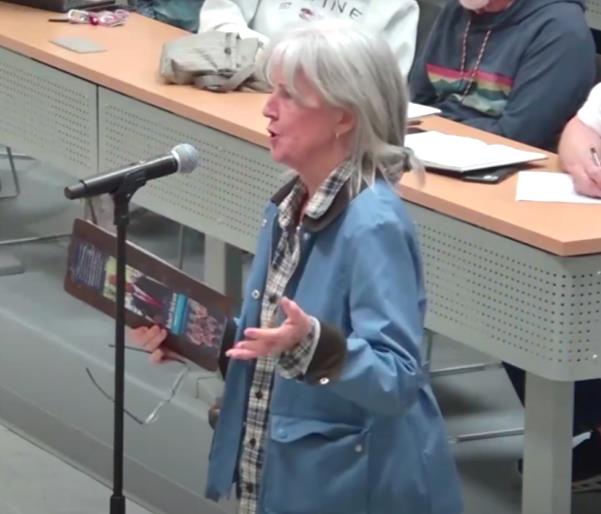
Rogers fears people like her are being priced out of Ithaca by its high school taxes. “If things don’t soon change in this company town,” she predicted, “it’s going to be a gated community perfectly fitted to suit our freeloading neighbors on the east side of the lake.” By that, she was thinking of Cornell University.
“There are no layoffs?” Jim Mann asked with amazement. He’d prefer some. He’d spoken against the earlier budget as well. “Our mission here is to educate students,” not to focus on extracurricular activities, he argued. “We need to run an austerity budget and focus on our core mission.”
The Ithaca District “cannot afford to be all things to all ideas,” Michael Hayes said as the hearing’s final speaker. The district “needs to develop a trajectory of cutting costs.” Hayes would return education to the “three R’s.” He’d also fire the School Superintendent, Dr. Luvelle Brown. Hayes urged the incoming Board of Education to do just that.
Customarily, Ithaca School Board members respond to public comment as soon as the comment period ends. Not this time. It was not until after a 40-minute executive session, one wedged between the hearing and the meeting’s regular business, that elected leaders chose to comment. Most hearing attendees had already left. Eldred Harris took his turn to speak. He spoke longest.
Eldred Harris, African-American, is the 15-year incumbent who finished dead-last in this year’s seven-way race for three seats on the Board of Education. He’s among the Board’s a staunchest defenders of robust spending to pay for better programs, especially for students who look very much like him.
In what may have become his swan-song as he exits elected office, Harris took passing swipes at many. Targets included teachers who decline to innovate; critics who fault schools for poor performance by using outdated data; and most particularly, those now obsessed with keeping taxes low at the cost of slighting students.
“Equity costs money,” Harris insisted. And equity, he argued, is something “that we are now threatening to completely wipe off of the table.”
Inequity within the Ithaca District, Harris observed, has been a decades-long problem, not something that’s brand new. “And to make yourself appear that you are now concerned about the issue is both duplicative and it disgusts me.”
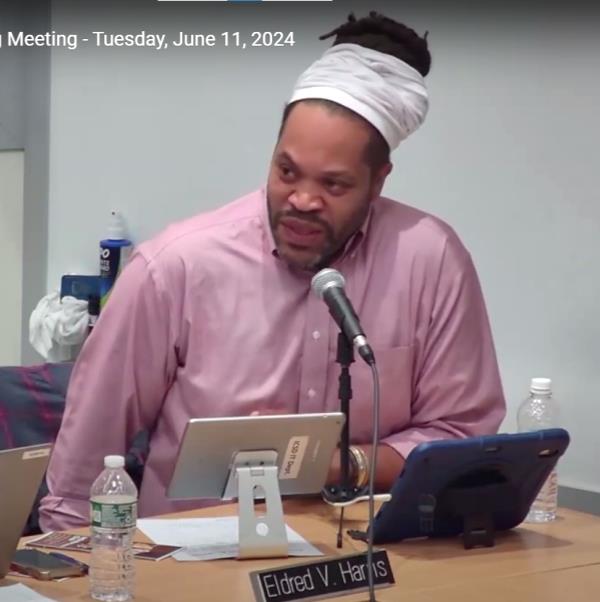
Eldred Harris took an all-too-transparent parting shot at one of the newly-elected people who’ll replace him, development executive Todd Fox.
“The folks who rabidly have gone after tax abatements in this community in a profiteering attempt to get in while the getting is hot, to stand at this microphone and debase children, you should be ashamed,” Harris emphasized.
For the record, Todd Fox, while he may have complained of high taxation and sought to add his managerial expertise to the school board’s skill set, has never, to this observer’s knowledge, “debased children.”
“The community, using democratic methods, made it clear that my voice is no longer needed, Harris concluded, acknowledging his defeat. “But I’m going to warn all of you that I’m going to be watching.”
And then, the sting of Eldred Harris’ defeat—and most particularly, defeat by a man he quite obviously does not respect—became its most evident.
“We built something here that was built for children,” Harris said. “And folks now with no knowledge are threatening to destroy it by infusing fear and illogic into the conversation.”
Whether hyperbolic or maybe all-too dead-on accurate, Eldred Harris will leave office at month’s end.
****
An issue that got almost no attention at the Ithaca budget hearing Tuesday was the bus proposition. Rejected in May, just like the budget, the proposition to buy new school buses and other vehicles will face Ithaca’s voters again June 18th. But just as with the budget, bus spending will now cost less. This time, voters will decide a $1.6 Million proposition to commit fiscal reserves to purchase two electric school buses, plus two more that run on propane. The spending and the number of purchases are exactly half of what voters were asked to approve, but rejected, last month.
As the meeting headed into its final, fifth hour, the Board of Education offered its first extended discussion of member Jill Tripp’s proposal—a long shot though it may be—to negotiate with Cornell University to increase from its current $650,000 to $10 Million Cornell’s payment to the District in lieu of taxes.
“How did you come up with the amount of 10 Million?” Board colleague Karen Yearwood asked.
“I made it up,” Tripp candidly replied. She then elaborated. To Tripp the amount is only about a quarter of what some argue Cornell deserves to pay.
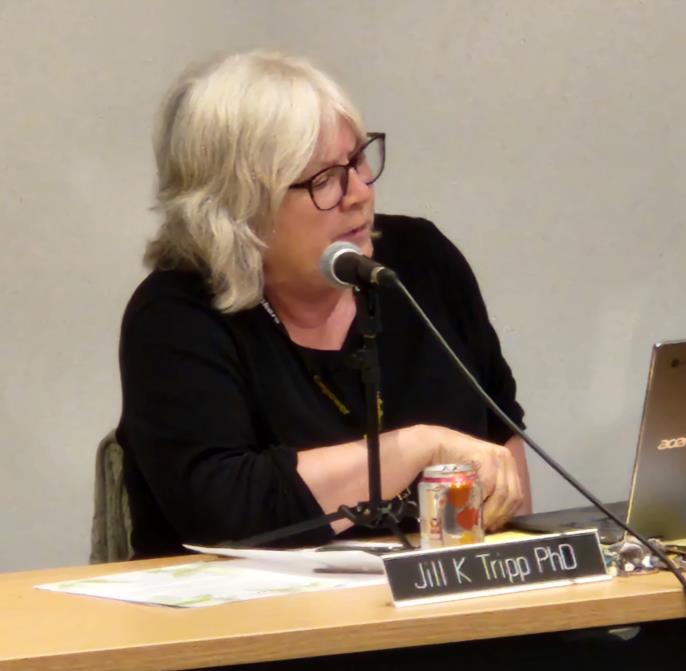
When it comes to Jill Tripp’s appeal to Old Ezra, some might say “Good Luck.” And Tripp foresees no easy task in the uphill climb ahead. It may be as challenging as trudging up Libe Slope in a snowstorm.
“This is a huge undertaking,” Tripp said of the prospective negotiations. “And I don’t think for a moment that the School Board is able to take that on.”
Or maybe, District Administration, either. While Dr. Tripp had proposed Superintendent Brown be tasked to haggle with Cornell, School Board consensus that night favored tossing the task to an advisory committee, one comprised of district officials and community representatives.
“I would not like to see our Superintendent go out there alone on this,” Eldred Harris told those at his head table. “To go in not necessarily blind, but with a hand out saying ‘pay what you owe,’ would not lead to the successful result we want,” Harris concluded.
Jill Tripp claims other Ivy League universities pay seven or eight figures to their own hometown school districts. Princeton, she said, pays $4.8 Million; Brown University, $1.3 Million; the University of Pennsylvania, $10 Million.
Board President Sean Eversley Bradwell raised a complication: Cornell is a hybrid; a public-private university. Might the school district find itself negotiating, at least in part, with the State of New York?
The Board of Education may decide how to proceed with Jill Trip’s initiative at its final meeting of the school year, June 25. By that time, they’ll know whether they’ll need to go the Contingency Budget route.
###

